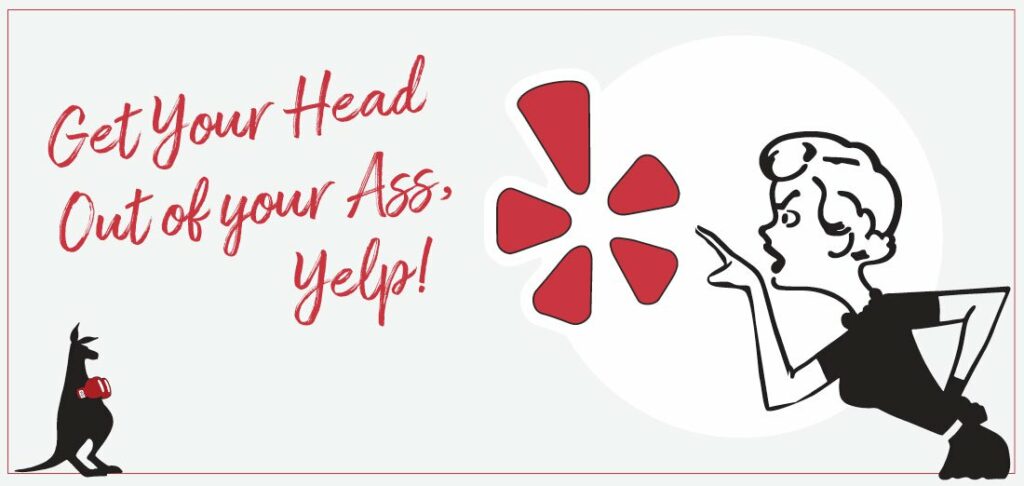Dear Yelp,
As a business, there are many reasons to hate on you. Perhaps the number one reason is because you filter reviews; you filter good reviews (and sometimes bad ones) from real reviewers who want to express their opinions. Don’t get me wrong, I am all for filtering reviews. There has to be a way to filter out reviews that are not legitimate criticisms or praises of a business’s services. Google does it and they do a pretty good job of being fair when filtering reviews (but sometimes they are jerks, too).
You on the other hand, are not.
Want to know why? Don’t worry, I’ll tell you why. I’ve noticed you call your filtering algorithms “Yelp’s Recommendation Software”. Perhaps you named it this to soften the blow of what Yelp actually does; you’re the sword that cuts off the head of many legitimate reviews.
In YOUR own words:
“We use automated software developed by our engineers to recommend reviews from the Yelp community. The software looks at dozens of different signals, including various measures of quality, reliability, and activity on Yelp. Most of all, however, it’s looking for people who are intrinsically motivated to share the wide range of rich and detailed experiences they have every day with local businesses.”
Even more annoying is that you don’t even want businesses to ask for their own reviews. In case you haven’t seen them lately, here are your very own guidelines.

Here’s the deal, Yelp. Patrons are motivated to write reviews for businesses in the hospitality industry like restaurants. It’s a social thing. You of all sites know this and have developed your product around it. People are happy to share with their friends where they ate and what their experience was like; they are less excited to write a review for those in the service-provider industry. Consumers rarely say to themselves, “I sure am glad that plumber showed up on time. He was proficient and charged me $500 to fix my leaking toilet, so now let me write a positive review for that company.” Life is busy and once the service provider is out of their home, the customer is on to the next task of trying to figure out how many bake sales are needed to pay for the $500 bill they were just served.
Most service-oriented businesses have to ask for reviews. Otherwise, the only reviews they have are all from those customers who have had a negative experience, because it’s this group who is most motivated to take the time to write an online review.
The crazy thing is, you have a long history of paying people to write reviews.
Remember this?
Your CEO Jeremy Stoppelman, told The New York Times in 2007 that “there was a time in our earlier days where we experimented with paying for reviews directly in cities outside of San Francisco to help get the ball rolling in our otherwise empty site.”
However, you claim to have not done this for at least four years. Mmmmmhm.
Ding. Ding. Ding.
When a business does not have a lot of reviews on an “empty site,” they have to ask for them. While this statement was from 2007, it still holds true for all businesses today.
Are you asking for reviews in 2017? Yeah, you are!.

This is the greeting we get when we go to Denver’s Yelp page. You asked us to write a review for a restaurant we were researching and another restaurant that we ordered from (but didn’t you just say businesses can’t ask for reviews?).
When we ordered food from your new buddy, Yelp Eat24, they asked us to write a review. Interesting side note, it was announced on August 3, 2017 that GrubHub is in the process of acquiring Eat24 for $287.5 billion.

We get it, restaurants are your bread and butter. It’s your second most reviewed category. https://www.yelp.com/factsheet

Got it.
Compared to other industries, you rarely filter restaurant reviews using “Yelp’s Recommendations Software.”
Simply put, you have your head up your derriere.
You ask for reviews but punish other businesses for soliciting reviews themselves? I am sure that if you were to talk to your people, they might be able to offer a pretty good BS answer that would satisfy this question—roll up your pant legs.
So you know what we tell businesses to do? We say, “Ask for the review. Yelp does. Take your chances because you don’t want your overall star rating to be in the hands of those motivated to write a negative review. Let’s get your happy customers talking about you.”
Just keep in mind this statement from your very own CEO, Jeremy Stoppleman.
“We put the community first, the consumer second and businesses third”.
Yours Truly,
WebPunch

Ginger Jones is a co-founder and resident workhorse at WebPunch. When she’s not slaving away at her desk, she’s diligently playing with her many nieces and nephews, who are her soul. She is a lover of architecture, movies as background noise and all manner of kid food like pizza and tacos. She longs to one day be an urban farmer (bees and chickens) and solemnly vows to bring stylish farmer overalls to the masses.


